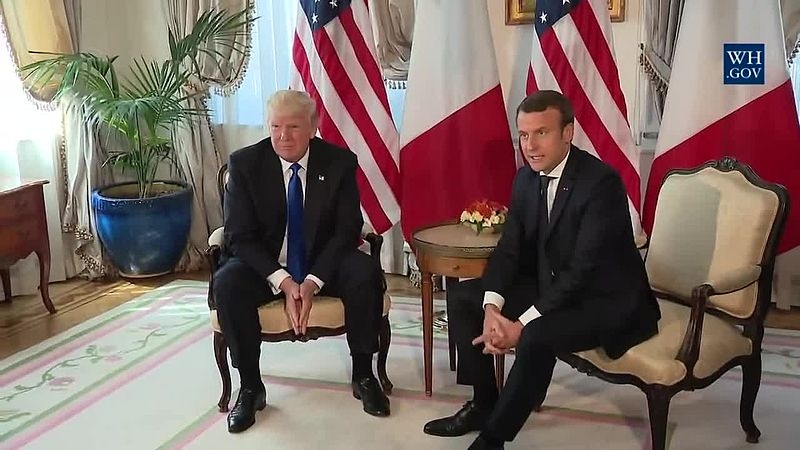The last Trump-Macron Summit was a masterpiece of communication. The two men multiplied their signs of complicity and intimacy in front of the cameras. To indicate the strength of their relationship, The French president even declared, "We are two Mavericks." In addition, both criticized the difficulties imposed by the political system, while emphasizing that they have never been politicians to be used, nor were they part of a partisan machine.
Yet the president of the United States did not surrender: not on the climate, nor on Iranian nuclear energy, nor on trade protectionism, nor on any subject. He did not stop repeating, emulating Macron: "I do what I say." In his first year in office, Donald Trump has received the fiercest criticism. International observers have not tired of repeating that he is "unpredictable." But a foreign policy is judged by its results.The so-criticized "extremism" against North Korea has not led to a nuclear war. On the contrary, under pressure, China managed to convince its ally to accept negotiations for denuclearization, something unthinkable a few months ago.
 Trump and Macron at the White House. Emulating his French counterpart, the US president kept repeating: "I do what I say." Photo: Wikimedia Commons. |
In the Middle East, the American demands, that is, the security of Israel, have been respected. They have achieved an objective alliance between the Gulf monarchies and the Jewish state in opposition to Iran. In return, the Sunni monarchies were called on to finance the war effort.
Trump's decisions can be challenged, but they cannot be reduced to the moods of an unpredictable man. Trump, to gather the necessary regional support, has emphasized bilateral relations. The diplomacy of international summits is not his favorite.
His "twittomania" and the prevarications of his Administration have contributed to the blows at his actions at the international level and to the idea of unpredictability. This is the explanation that can be given to the "Maelstrom", which referred to basic posts in the administrative machine.
After several attempts, Trump seems to have found some stability with three complementary profiles for key positions. Thus, Gina Haspel, who has been head of the CIA, has devoted her entire career to the agency and is an expert in the fight against terrorism. She is called "the iron lady," as she favors the strong methods that correspond to the speech of the president of the United States. Above all, he has an absolute distrust of Iran.
Rex Tillerson, on the other hand, was replaced in the State Department by Mike Pompeo.The former director of the CIA is also aggressive regarding Iran. By relying on his partisan experience in the US Congress and his transfer to the CIA, he would be able to reject the president's strategies.
He spoke in his Senate hearing about "strengthening the finest diplomatic corps in the world. America and the world need us to be that."
He made his first trip to the Middle East beginning with Israel. While maintaining its hard line on Iran, the basis of an objective alliance between the Jewish state and the regional Sunni powers, he also affirmed that "the main priority is to destroy ISIS and other terrorist groups." The problem of the financing of terrorist groups is there even for the regional allies of the United States.
According to The Washington Post, Qatar has paid hundreds of millions of dollars to various terrorist groups to free their hostages, particularly members of the royal family. According to the same newspaper, those hundreds of millions of Kuwaiti dollars were donated to Syrian rebel groups such as Jabhat al Nusra. Former US Treasury Secretary Davis S. Cohen described Kuwait as "a kind of fundraiser for terrorist groups in Syria." All this is real challenge for the Trump Administration and its objective effectively to combat terrorism in the region.
Finally, John Bolton, the new National Security Advisor, is a neoconservative "hawk" of the Bush era. He has appealed for bombing North Korea to defend the interests of the United States instead of getting stuck in multilateral agreements. Bolton recently said on Fox News that Trump should only meet with the Korean president if he "agrees to give up his entire nuclear weapons program" --proof that he is the interpreter of the ultimate reasons for the president having been elected, far from the influence of the media.
This triptych will be the basis of the policy that Trump can implement without presidential problems. He will surely withdraw from the agreement with Iran, which, despite the pleas of the European Union, he considers catastrophic. At the same time, it would likely strengthen the Arab-Israeli alliance against Iran. The discussions with North Korea will be difficult, if not tumultuous. The question of Russia will remain.
The United States is less concerned about Ukraine and the Crimea, but Syria represents the risk of a direct conflict. To avoid this direct confrontation and have others pay for the war effort, Trump would like to replace US troops with Arab troops. The famous political solution is not a priority at this time. There is nothing unpredictable in the agenda of the world leader. Will it work? History will speak.
Ahmed Charai is Chairman and CEO of Global Media Holding. He sits on the Board of Directors of The Atlantic Council in Washington and International Councilors at The Center for Strategic and International Studies. He is also Board of Trustees of the The Foreign Policy Research Institute in Philadelphia, a member of The National Interest's Advisory Council and a member of the Advisory Council of Gatestone Institute in New York.
This article was first published in La Razon. It is reprinted here with minor changes with the kind permission of the author.


